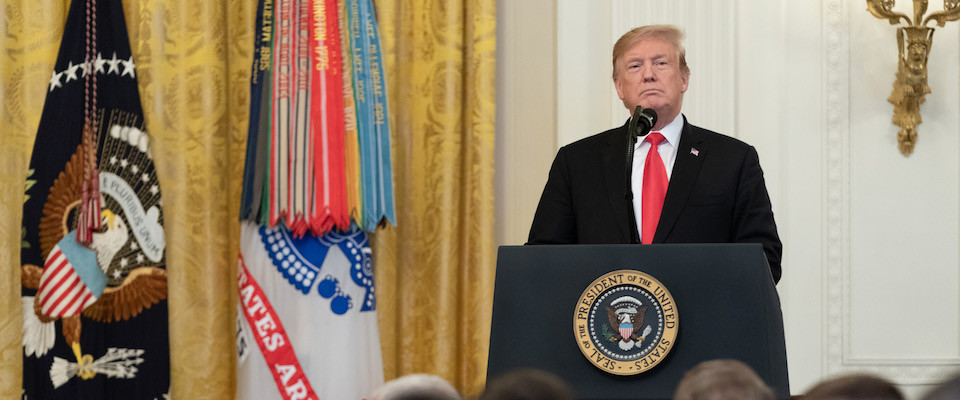By: Jeremy Dys – firstthings.com – May 2019
Two years into Donald Trump’s presidency, conservative religious voters who supported him despite reports of his personal immorality appear to have been vindicated. Religious freedom has turned out to be, as candidate Trump promised, one of President Trump’s chief priorities. And he has prioritized it to good effect.
Three months into his presidency, Trump addressed religious leaders in the Rose Garden. Among them were members of the Little Sisters of the Poor, the face of conscientious objection to the Obama-era contraceptive mandate. Trump invited two of the sisters to the stage and told them, “Your long ordeal will soon be over.” He then signed an executive order “Promoting Free Speech and Religious Liberty.”
The order committed the executive branch to discharging a duty the previous administration had neglected: “It shall be the policy of the executive branch to vigorously enforce Federal law’s robust protections for religious freedom.” The Obama administration, rather than enforce these protections, had tweaked administrative rules so as to force religious individuals and organizations into litigation to defend their right to free exercise. Though closely held for-profit corporations received hard-won relief under the Supreme Court’s decision in Burwell v. Hobby Lobby (2014), nonprofit ministries such as the Little Sisters of the Poor had been compelled to return to court.
The Executive Order on Free Speech and Religious Liberty ended the Obama-era aggression. The White House premised the order on the vision of the founders for “a Nation in which religious voices and views were integral to a vibrant public square,” a nation in which the faithful would be “free to practice their faith without fear of discrimination or retaliation by the Federal Government.”
President Obama famously told a deadlocked Congress, “I’ve got a pen, and I’ve got a phone.” When Congress refused to give him the legislation he wanted, he employed both pen and phone, leading many to complain that the business of lawmaking was being taken over by the administrative state. Not so President Trump on religious liberty. His executive order noted plainly: “Federal law protects the freedom of Americans and their organizations to exercise religion.” Thus, no new laws were needed. The only change required was to see to it that existing laws be fully implemented and faithfully executed.
That commitment to executing the law, and thus protecting the free exercise and religious conscience of Americans, culminated in Section 4 of the executive order, which directed the attorney general to “issue guidance interpreting religious liberty protections in Federal law.” A few months later, that guidance came before the president’s cabinet. In a twenty-five-page memo, then–Attorney General Jeff Sessions outlined twenty principles of religious freedom and guidance for their implementation, followed by an appendix chock-full of supporting case law.
The guidance was new—no president had ever before directed an attorney general to provide it—but its content was not. Attorney General Sessions announced no new rules and proposed no new laws. He simply explained what the law was and how the agencies were to regard it.
Sessions’s guidance affirms the various protections of the Religious Freedom Restoration Act (RFRA). Paragraph 11 notes that though RFRA quite clearly protects individual citizens, it should also be read as extending to “organizations, associations, and at least some for-profit corporations.” The citation adduced for this interpretation is Burwell v. Hobby Lobby. In that decision, Justice Samuel Alito, writing for the majority, pointed to the Dictionary Act’s definition of the word “person,” which happens to anticipate the language of paragraph 11 of the Attorney General’s guidance on religious liberty: “The wor[d] ‘person’ . . . include[s] corporations, companies, associations, firms, partnerships, societies, and joint stock companies, as well as individuals.”
President Trump, through Attorney General Sessions, was applying to the executive branch what Justice Alito’s opinion in Hobby Lobby had made plain: “No known understanding of the term ‘person’ includes some but not all corporations.” No longer may agency heads restrict the effect of RFRA to the individual or nonprofit; rather, RFRA’s protections are to be read—and applied—expansively.
Sessions highlighted the restraint placed upon government by the right to religious liberty. When engaging in enforcement actions, “agencies should remember that RFRA applies to agency enforcement just as it applies to every other governmental action.” Nothing new, just a reminder that religious liberty law serves as a check on the administrative state, to the benefit of a free people.
Executive agencies took notice. The U.S. Department of Health and Human Services crafted rules ending the Little Sisters’ “long ordeal.” Under the new rules, the federal government would exempt from any requirements relating to “the provision of contraceptive services” any group health plan or insurance coverage maintained by an “objecting organization” such as a church, religious order, religious school, nonprofit organization, or other non-governmental employer.
The Department of Justice began to resolve outstanding cases. […]
To see the remainder of this article, click read more.
Source: Trump and Religious Liberty by Jeremy Dys | Articles | First Things
 Listen Online
Listen Online Watch Online
Watch Online Find a Station in Your Area
Find a Station in Your Area








 Listen Now
Listen Now Watch Online
Watch Online
